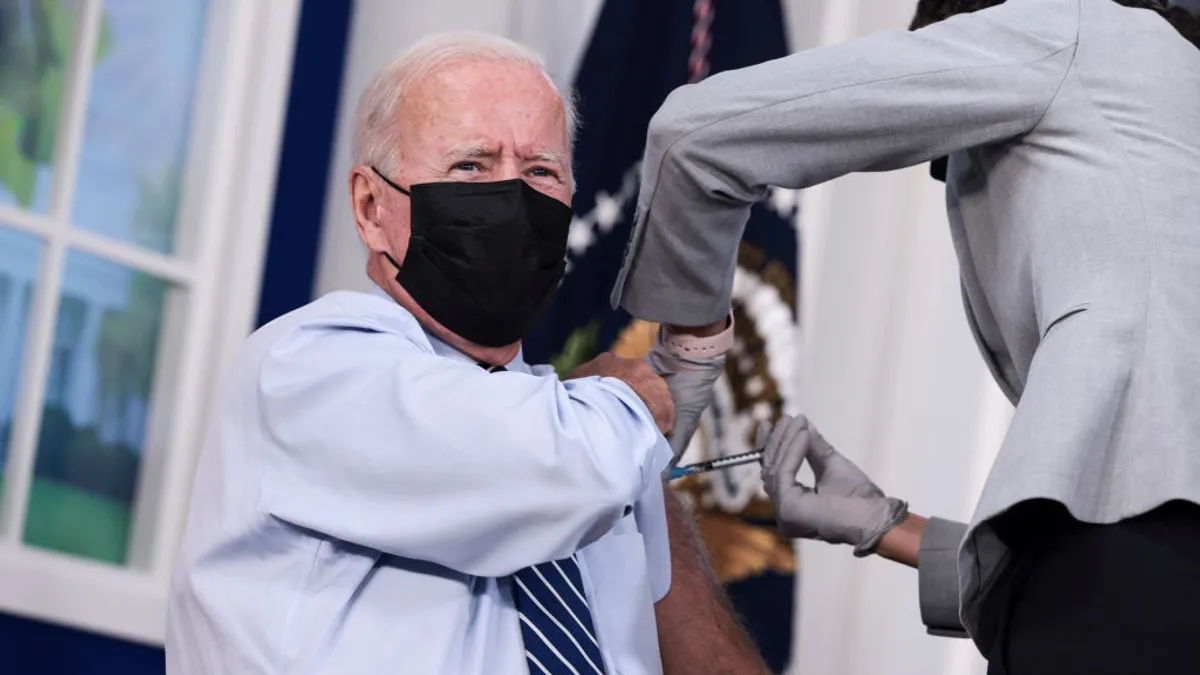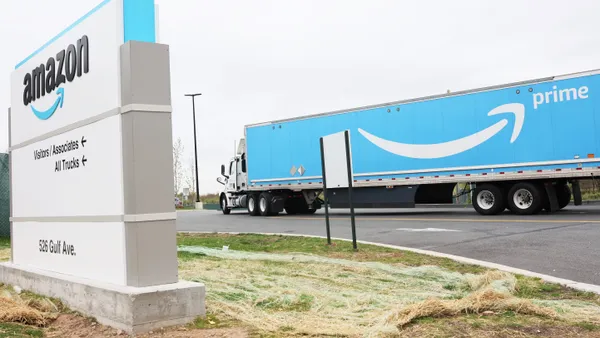UPDATE: Nov. 8, 2021: The 5th U.S. Circuit Court of Appeals on Saturday temporarily stayed the Occupational Safety and Health Administration's emergency temporary standard that would require employers to set a mandate for employee vaccination and offer a testing alternative.
In a tweet Saturday, U.S. Department of Justice spokesperson Anthony Coley confirmed the agency plans to defend the vaccine mandate.
"The OSHA emergency temporary standard is a critical tool to keep America's workplaces safe as we fight our way out of this pandemic," Coley said. "The Justice Department will vigorously defend this rule in court."
Dive Brief:
- Employers with at least 100 employees will need to implement a COVID-19 vaccination requirement for their employees — and offer a weekly testing alternative to those who refuse or are unable to receive a vaccine — presumably by Jan. 4, 2022, according to an emergency temporary standard issued Thursday by the Occupational Safety and Health Administration.
- In determining whether they meet the 100-employees threshold, employers must include all employees across all of their U.S. locations, regardless of employees’ vaccination status or where they perform their work, per the ETS. Part-time employees do count toward the company total, but independent contractors do not. Additional sections of the ETS detail how the threshold should be determined in situations involving franchisees, multi-employer workplaces and staffing agencies.
- All covered employers are required by the ETS to bear the cost of providing up to four hours of paid time and reasonable paid sick leave needed to support vaccination, but where an employee chooses to remain unvaccinated, the ETS does not require employers to pay for the costs associated with regular COVID-19 testing or the use of face coverings. Some employees may be entitled to reasonable accommodation from their employer, absent undue hardship, due to a medical condition or sincerely held religious belief. Stakeholders have until 30 days after the date of the rule’s publication to submit public comments.
Workers see mandates as a perk in the job search
Dive Insight:
Supply chain experts and stakeholders have voiced concerns that the mandate could lead to short-term pain, even though recent polls suggest workers largely favor vaccine mandates.
But busy as ever, warehouses and distribution centers need all the help they can get. Logistics giants like FedEx and Amazon have struggled to staff their facilities with enough workers ahead of a peak season where they will need tens of thousands of seasonal workers to keep operations running smoothly.
The surge in demand that comes with the peak holiday shipping season will ease by Jan. 4, the date by which OSHA is requiring vaccine mandates. This means companies with sizable warehousing and distribution footprints won't have to enforce the mandate until the busiest time of year is over.
Some companies have already announced vaccine mandates for U.S. workers, such as Tyson Foods and McDonald's for its corporate employees. Others are waiting for the federal mandate to take place, like BWX Technologies, whose CEO Rex Geveden said during an earnings call that the nuclear component and fuel supplier is "well pleased with the vaccination rates generally in the U.S. plants."
The trucking industry has voiced particular concern about the vaccine mandate. In a letter to President Joe Biden, various U.S. trade associations said the mandate could lead companies to "lose 37% of drivers at a time when the nation is already short 80,000 truck drivers." Old Dominion Freight Line offered its employees an incentive to get vaccinated at one point, but CEO Greg Gantt expressed concern during an earnings call that the weekly testing mandate for unvaccinated employees would be difficult to implement.
"I don't want to say 'impossible,' but there's some challenges that I think are going to be very difficult, if it comes to that," Gantt said.
















